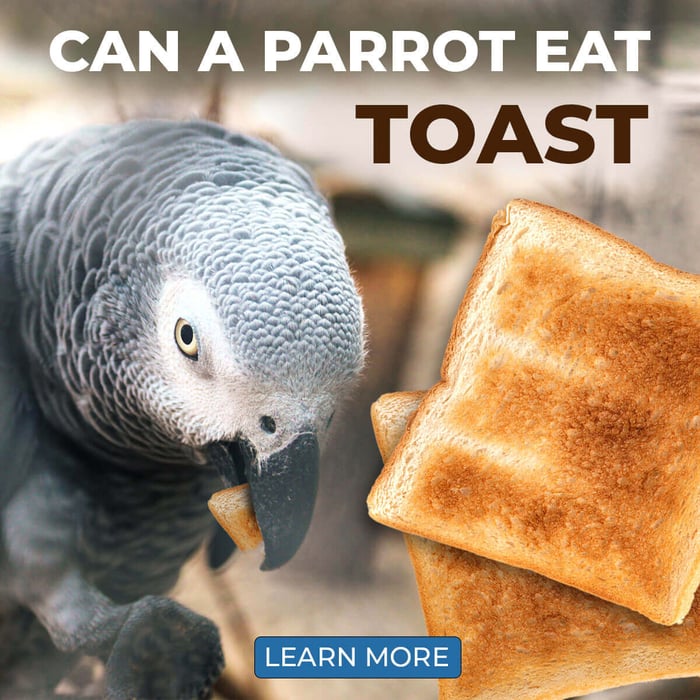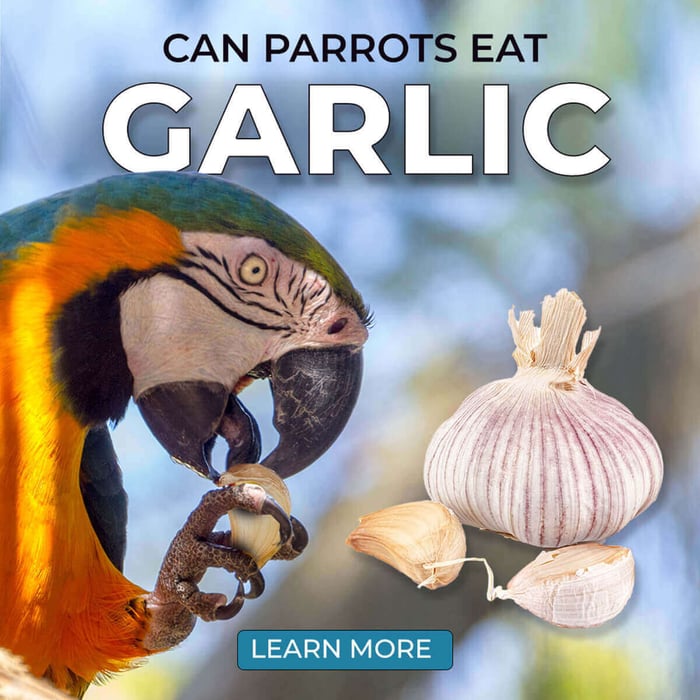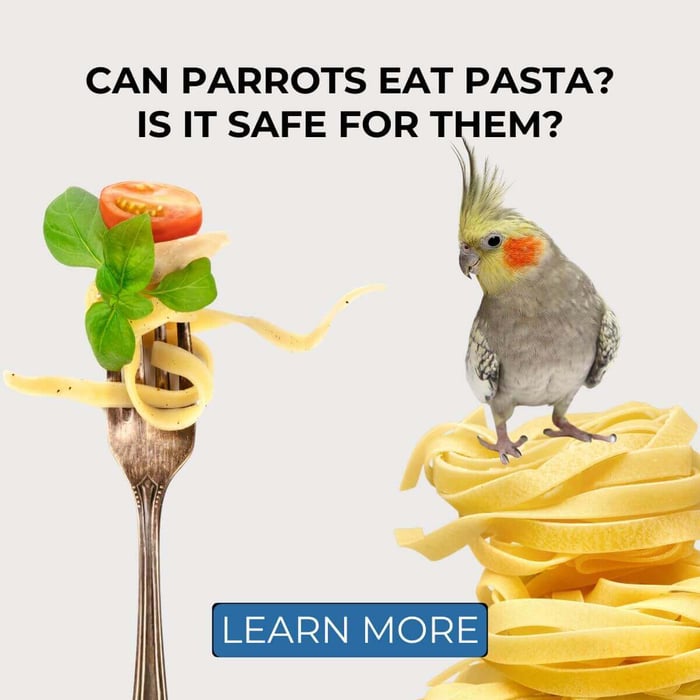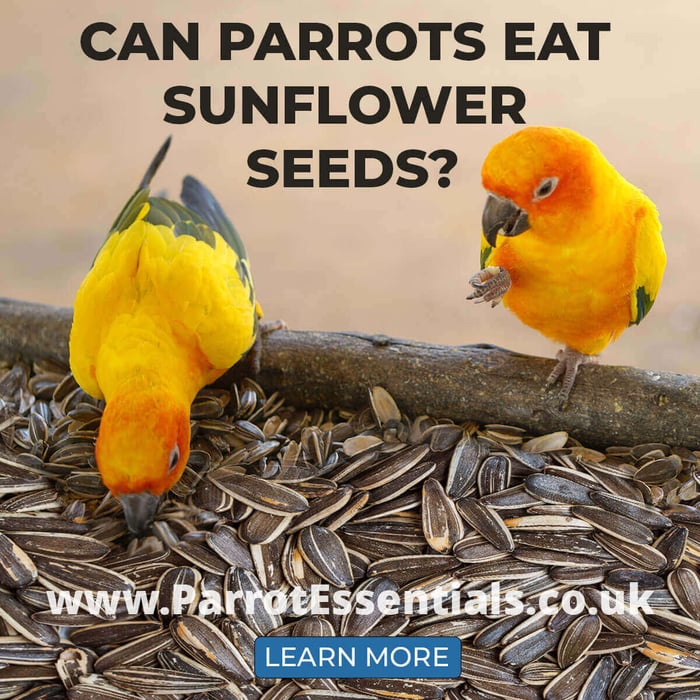What Human Foods Can Parrots Eat?
We are used to feeding our parrots things like pellets, seeds and nuts. But have you ever wondered if parrots can eat our food, human food? The answer is yes – there are many types of human food that we can share with our companion parrots. If used wisely and sparingly, even kitchen scraps can easily become a part of your parrot’s diet without harm. But what human foods can parrots eat?
Offering your parrot bird-safe food, scraps, and other tidbits is a great way to save money by using food that might otherwise be thrown away. By turning scraps into bird food, less is wasted. At the same time, your parrots can enjoy a greater variety of treats, which helps prevent boredom and ensures it’s getting all the micronutrients they need.
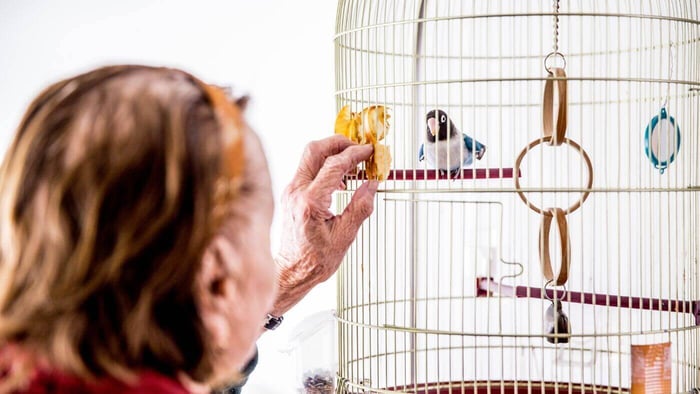
But which human foods and kitchen scraps are safe? Let’s have a look at a variety of foods you may have lying around your home that are actually perfectly safe for your parrot to consume.
Strawberries
Strawberries are full of nutrients such as Vitamin C, Vitamin K, Vitamins B1 and B6, Potassium and Magnesium, which are good for bird health. And whereas we humans usually throw away the green crown, parrots will love to snack on it!
As long as you’re using organic strawberries, the tops can be used, and it makes for a safe and nutritious treat.
Carrots
Carrots are a vitamin-rich food that is a favourite of many pet birds. They contain a high level of beta-carotene, are lightly sweet and pack a nice crunch.
But did you know that parrots can eat more than just the carrot itself? If you’ve just chopped a few organic carrots up for a nice salad, you can offer the green tops to your bird. They’re non-toxic and safe, not to mention packed full of healthy nutrients and fibre.
Did you know? Your parrot can also eat beetroot tops and radish tops. In fact, so can you!
Cucumber
Cucumbers have plenty of nutrients such as Vitamin C, Vitamin K, Magnesium, Potassium, Manganese, and water, which are beneficial for your parrot’s health. Birds can eat them raw, boiled, mashed and sliced. You do not have to remove the seeds, as they are not toxic to birds.
Apple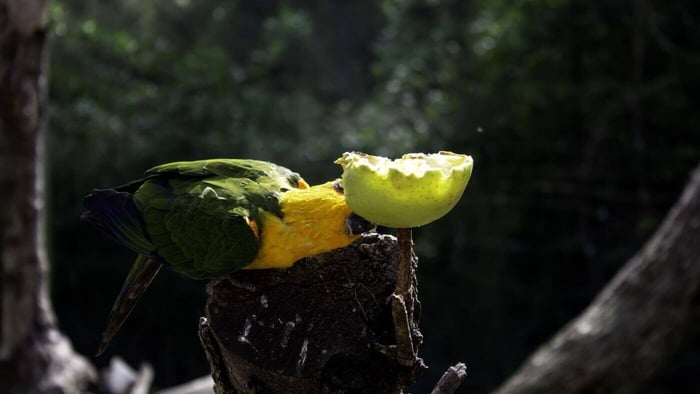
Although parrots shouldn’t eat apple seeds, you can give them the rest of the core. That way, someone gets to enjoy it, and you don’t just have to throw it away.
And by the way, the same goes for pear cores, of course!
Melon and Squash Seeds
Did you know that parrots can consume the seeds of pretty much any fruit of the Cucurbitaceae family that we eat? This means that after scooping the seeds out of a melon, you don’t have to throw them away – you can offer some to your bird!
The same goes for squash and pumpkin seeds, which are actually huge favourites among parrots. Just make sure not to overdo it with these because they’re a good bit fattier than melon seeds.
Did you know? If you have an organic watermelon, your parrot can even eat the rind. Larger species like macaws and cockatoos will make fast work of it!
Pepper Seeds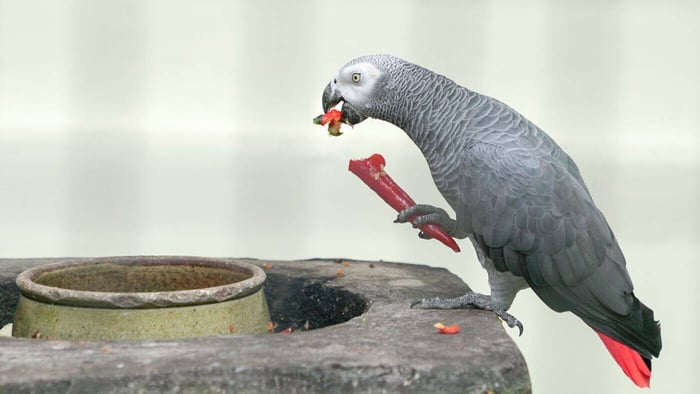
To us, the seeds inside a sweet pepper or chilli pepper mean little more than an annoying extra step during cooking. To your parrot, they’re a delicacy! Our birds love snacking on these parrot-safe seeds, so you can give them the entire pepper placenta (that’s what the bit that holds the seeds is called) instead of throwing it away.
Cauliflower Leaves
If you buy a head of cauliflower, there are usually still some leaves attached. Now, most of us throw these away, but did you know they’re actually edible? If you don’t feel like having them for dinner tonight, no problem: your parrot will love to have them as a snack.
Cabbage
Cabbage falls into the category of healthy green vegetables. One of the main nutrients your bird can get from it is calcium, an essential nutrient for avian reproduction. Calcium-rich food is consumed by breeding birds for the production of eggshells, as well as by parrots in general, to keep their bones and feathers healthy.
If you’re preparing some cabbage for your dinner, be sure to offer some to your parrot. You can also give them the cabbage heart, a part that we humans tend to throw away. Just keep in mind that red cabbage can stain, so your bird may need a bath after mealtime!
Lettuce
Lettuce is also a wonderful addition to any pet parrot’s healthy diet, especially the leafy green types. Not only do most birds love to eat these healthy veggies, but they are also full of nutrients and antioxidants that can boost your bird’s immune system.
Celery
Celery has Vitamin A, Vitamin C, Vitamin K, Folate, Potassium and a lot more. These nutrients are beneficial for the growth of our birds.
Although it’s sometimes said that the stringiness of celery can cause issues with parrots’ digestive systems, we’ve never actually heard any proof of this. Still, if you’re worried, you can opt to only offer the leafy tops.
Nuts
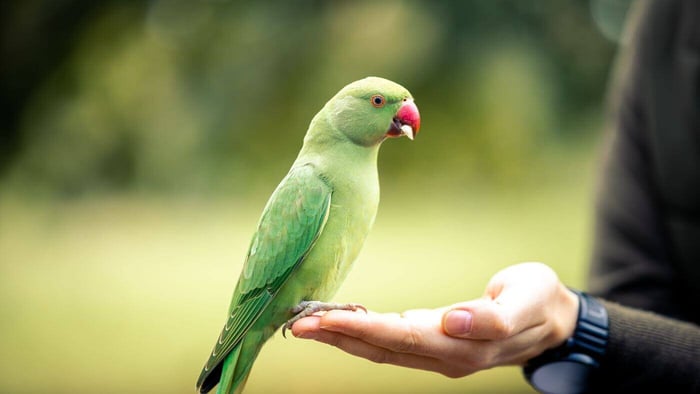
Nuts are a popular source of food for many birds! Various parrot species consume nuts in the wild. They are a healthy source of fat to help keep a bird’s skin and feathers healthy.
Of course, you shouldn’t overdo it if you want to offer your parrot some nuts to snack on. Still, you can definitely share any unsalted walnuts, almonds, pistachios, Brazil nuts, macadamia, hazelnuts or whatever else you’ve got on hand. Chop them into small pieces and use them as treats.
Peas
Peas are a very healthy option that contains nearly all the essential nutrients a bird could need. Sprouted peas are considered particularly nutritious: they contain Vitamin A, Vitamin B, Thiamine, Folate, Riboflavin and a lot more! Peas also contain carbohydrates and fibre, plus proteins and antioxidants.
You can share any type of pea with your parrot, with the exception of canned ones, as they tend to be high in salt and relatively devoid of nutrients. Go for frozen green peas, snow peas, snap peas, dry split peas (for larger parrots) or whatever else you happen to have on hand.
Cereal
Cereal is a popular human breakfast food. Depending on the type, cereal is also safe for our birds to eat. Stale or leftover cereal is a tasty bird treat. To avoid issues, be sure to offer brands with low sugar content that don’t contain artificial dyes, flavourings or preservatives.
Oats
Porridge oats could also be a nutritious food source for your parrot, and chances are you’ll have them readily available in your kitchen. They’re very cheap and versatile: you can offer raw oats, but you can also cook them to see if your parrot enjoys oatmeal.
Pasta
Cooked plain pasta is a great source of carbohydrates for parrots, especially the whole-wheat kind. If you’re cooking up some spaghetti, penne or fusilli for dinner, consider boiling a few pieces separately in unsalted water to offer to your bird. It will be much appreciated!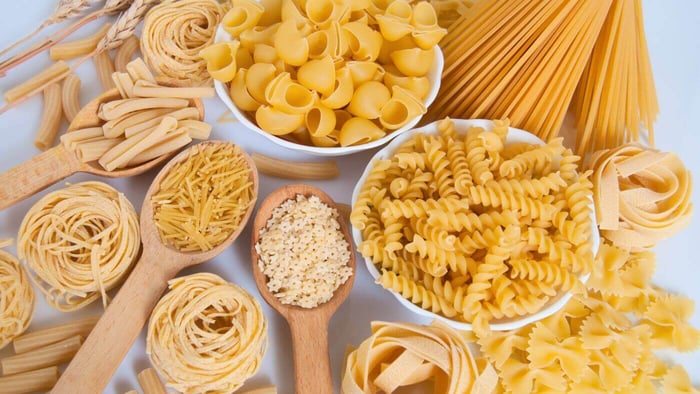
Eggs and Egg Shells
We know it sounds a bit odd to feed eggs to a bird, but cooked eggs actually offer many essential nutrients for parrots.
Crushed eggshells (from boiled eggs, not uncooked) can also be offered, as some parrots will eat them in order to get the calcium they need for proper bone and feather development.
Meat
Yes, parrots can eat meat in small amounts. They’re omnivores, and some will go for meaty foods in the wild if they can find them. It’s okay to offer your bird a few bits of cooked meat here and there, especially if it hasn’t been salted or cooked in oil.
Although some parrot owners report that their large parrots love cracking things like chicken bones, it’s best not to offer them. They can splinter and cause injuries.
Conclusion: What Human Foods Can Parrots Eat?
Feeding your pet birds does not always mean that you have to allot a special portion of your budget. It does not always need to be fancy or expensive. As long as you do your research about the particular species of your parrot and what food it can or cannot eat, And of course, do not forget to always consider the nutritional value they will get out of it. At the end of the day, your bird will be the judge!
Find everything that you need for your parrot at www.ParrotEssentials.co.uk/ShopByParrotSpecial

